| | 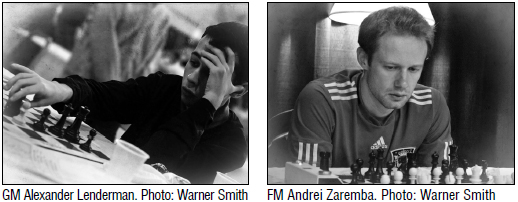 The Continental Open is always a special event as it is held in the waning days of summer, when the players are all dreading the return to habitude and dreariness that the impending autumn invariably brings with it. This melancholy gives the tournament a unique feel and molds well to the idyllic setting, a lake embedded into the hill-strewn landscape of historic Sturbridge. The water, lapping at your feet as you celebrate victory or embracing your tired body and helping send away the sorrows of defeat, is deep and enticingly calm. The shores of the lake seem to be a slice of a different world, where the turmoil of our day to day life can be forgotten as we eat in the open patio of the Ox Head or roam around the Jaguar car show which always seems to fall on the same weekend as the tournament.
Much the same can be said about the tournament room itself which, devoid of windows, feels like a capsule in which time stops still. In fact, if it weren’t for the ticking of the scarce analog clocks throughout the long rows of white tables, it would be easy to forget that in a few short days we would be making the trek back to our hometowns. For some of us, like myself, who were getting ready to go to college, the tournament was a welcome respite from the grind of packing, and a final moment to be with the friends we would most likely forget as our resumes grew bigger and our wallets smaller. We held to it, believing that if we only focused harder on that next move, or waited longer for the last game to finish, we could somehow freeze ourselves in this snapshot of familiarity, safety, happiness.
Although the surroundings and people were familiar, the names at the top of the cross tables were not, as GM Alexander Lenderman, making a surprise appearance in the event, took first place accompanied by Andrei Zaremba who, like Lenderman, resides and plays in
New York. The duo swept through the field, each scoring 5/6, and although GM’s Georgi Kacheishvili, Alexander Ivanov, Sergey Kudrin and Master Charles Riordan gave heated pursuit they came up just short, each scoring 4.5/6. Ben Krause made an incredible run deep
into the event, holding Lenderman to a draw and beating GM Mikheil Kekelidze, before Ivanov put a stop to his theatrics with a technical endgame grindout in the 4th round. Ben continued to play well, however, drawing FM William Kelleher, before running out of steam in the last round and losing to promising NY youngster Aleksandr Ostrovskiy.
In the U2100 section, Ben Gershenov steamrolled his opponents as one of the top seeds should before finally accepting a draw in the last round against Maxwell Schwartz who, together with Andres Castaneda, scored 4.5/6, a full point behind Ben. Dean D’Souza equaled Gershenov’s score in the U1900 section as he built momentum from a first round forfeit win and swept first place accordingly, as his closest opponent, Scott Gorman, had requested a last-round bye before the tournament and thus couldn’t attempt to win the last game and pull level.
The U1700 section saw a fourway tie for first place, as William Gregory and Robert Shore drew their game in the last round allowing Jonathan Spinnell and Bela Kis to catch them with wins in the last round. The quartet scored 5 points each and divided the prize money for first-fourth place. Amazingly, the U1500 section saw the same scenario where a draw between co-leaders Patrick Erickson and Brian Furtado let two others, Michael Gordon and Leonard Gruenberg, catch up by winning their last round games. Yet another tie for first occurred in the U1300 section, but this time it was much more sedentary as Randy Frank and Michael Fishbein (no relationship, I presume, to GM Alexander Fishbein), overcame losses to James Taggert to spilt the top prize with 5 points each. Taggert was on fire in the first three rounds, but a tame second half of the event saw him drop off the leader board and into fourth place behind Adam Piche who had been leading the event but lost to Frank in the last round. Finally, the U1000 section saw a three-way tie for first between Joseph Han, Benjamin Marinelli, and Richard A. Lunetta, who showed no mercy to each other in the early rounds only to find themselves together in a group at the top of the table.
Alex Lenderman is rapidly becoming a world-class chess player, and he showcases his technique beautifully in this win over Canadian GM Pascal Charbonneau:
White:!Charbonneau, Pascal
Black: Lenderman, Alex
[B10] Caro-Kann
1.e4 c6 2.c4 d5 3.cxd5 cxd5 4.exd5 Nf6 5.Nc3 Nxd5 6.Nf3 Nxc3 7.bxc3 g6 8.d4 Bg7 9.Bd3 0–0 10.0–0 Nc6 11.Re1 b6 12.Bg5 Qd6 An unusual move; typically Black plays Re8 or Bb7 13.Be4 e6 14.d5 exd5 15.Bxd5 Qd7 16.Rc1 Re8 17.Rxe8+ Qxe8 18.Qd2 Bb7 19.Re1 Qf8 20.Nd4 Na5 21.Be7 Qc8 22.Nb5 Bxd5 23.Qxd5 Qc6 24.c4 Bf8 25.Bxf8 Kxf8 26.Re4 Qxd5 27.cxd5 Rc8 White's endgame is slightly worse as he will have trouble holding on to his d5 pawn 28.f3 a6 29.Nd4 Rc5 30.d6 Rd5 31.Nc2 Nb7 Black could have snatched the pawn here immediately with Rxd6, but this move forces the a pawns off the board as well, thus providing Black with a passed pawn. 32.Nb4 Rd1+ 33.Kf2 Nxd6 34.Re1 Rd4 35.Nxa6 Ra4 36.Nc7 Rxa2+ 37.Re2 Ra5 38.Rd2 Nc4 39.Rc2 Ne5 40.f4 Ng4+ 41.Kf3 h5 42.h3 Ra3+ 43.Ke4 Nf6+ 44.Kd4 h4! A very strong move which limit's White's ability to advance and protect his pawns. 45.f5 Ra4+ 46.Rc4 Rxc4+ 47.Kxc4 g5 gxf5 was also quite playable but this move, which leaves all of White's pawns weak, is simpler. 48.Kb5 Nh5 49.Nd5 Kg7 50.Kxb6 Nf4
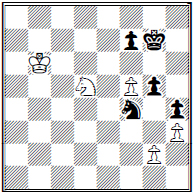
51.Ne3White has won the pawn back, but this has cost him a lot of time and his king is now too distanced. This is demonstrated best by the continuation should White have chosen to exchange knights: 51.Nxf4 gxf4 52.Kc5 Kf6 53.Kd5 Kxf5 54.Kd4 f3! 55.gxf3 Kf4 and with Black elbowing White's king, the position is easily won. 51...Kf6 52.Kc6 Ke5 53.Kd7 Ke4 54.Ke7 Desperation, but attempting to keep the knight on the board loses all of White's pawns: 54.Ng4 Kxf5 55.Ke7 Nxg2 56.Kxf7 Nf4 57.Nh6+ Ke5 58.Kg7 Nxh3 54...Kxe3 55.Kxf7 Kf2 56.Kf6 Kxg2 57.Kxg5 Kg3 Just in time to save the last pawn and clinch the game. 58.f6 Ne6+ 59.Kf5 Nf8 60.Ke4? A slight miscalculation, but it was too late to salvage a draw anyway. 60...Nh7 And White resigned because Black forces the f-pawn off the board. 0–1
Although my tournament did not go particularly well, it was highlighted by four very interesting games. Unfortunately, I lost three of them, and pulled out a win only through a blunder by my opponent late in the sixth hour of a very drawn position. The following game was the most exciting of the event for me, with both time controls getting down to the final seconds. If only the result had been different…
White: Yasinovsky, David (1922)
Black:!Bela Kis, Lorand (2180)
[C23] Bishop’s Opening
1.e4 e5 2.Bc4 c6 3.Nc3 Nf6 4.f4 d5 5.exd5 cxd5 6.Bb5+ Bd7 7.fxe5 Bxb5 Lorand miscalculates, and the following series of exchanges leaves me up a pawn. I don’t think he even looked at exf6 here, just Nxb5 after which Ne4 gives Black some play for the pawn. 8.exf6 Bd7 9.Nxd5 Nc6 10.Nf3 gxf6 11.0–0 Be6 12.Nf4 Bc5+ 13.Kh1 Qd7 14.Nh5 0–0–0 15.Nxf6 Qe7 16.Ne4 I'm up two pawns now, but time pressure was looming and I began to see premonitions of a dangerous attack on my king. 16...f5 17.Nxc5 Qxc5 18.d4 Qd6 19.Bg5 Rd7 20.b3 Rg8 By this point Lorand and I both had about 15 minutes left, and I began to enter panic mode. 21.Qd2 Bd5 22.Bf4 Qg6 23.c3 Qh5 24.Rf2 Rdg7 25.Qe3
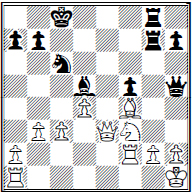
25...b6 Here Black had an opportunity to simplify into a drawn endgame which both Kis and I saw but severely underestimated: 25...Rxg2 26.Rxg2 Qxf3 27.Qxf3 Bxf3 28.Rag1 b5 29.b4 Ne7 30.h3 Nd5 31.Bd2 Rg6 and although Black is down an exchange and a pawn, White has to simplify into a very drawish endgame. 32.Kh2 Bxg2 33.Rxg2 Ra6 34.Be1 f4 35.Kg1 h6 and Black's passed fpawn compensates for him being down material. 26.c4 Be4 27.Ng5?? Simple blindness. I had decided that I had enough protectors on the piece. After Rg1, White would have been well on his way to repelling Black's threats and gaining victory. 27...Rxg5 28.Bxg5 Qxg5 29.Qxg5 Rxg5 30.Rd1 Nb4 31.Kg1 Nd3 32.Rfd2 Nf4 33.g3 h5 34.Kf1 Nh3 35.Re1 Rg7 36.d5 Ng5 37.Re3 Nf3 38.Rf2 Ne5 39.Rd2 Kd7 40.Rb2 Kd6
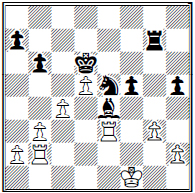
The time control has been reached, but with my scrambling towards the last five moves I have handed the advantage completely over to Black. However, I still have some resources in my position and the game stays very entertaining. 41.a3 Kc5 42.Rd2 a5 43.Rc3 Rh7 44.h4 I figured this to be the lesser of two evils; should I let Black play h4, he gets a passed pawn and a very weak white h-pawn out of the deal. This way, I have a glaring weakness on g3 but at least Black has no simple infiltration plan. 44...Rg7 45.Kf2 Rg4 46.Re3 Nf7 47.Rb2 Nd6 48.Rbe2 a4! 49.bxa4 Nxc4 50.Rb3 My plan here is to trade off all the queenside pawns, even if it means ending up down material. 50...Kxd5 51.Rb5+ Kc6 52.Rb3 Rg8 53.Rc3 Kc5 54.Re1 Ra8 55.Ra1 Rxa4 56.Ke2 b5 57.Rb3 Ra8 58.Kf2 Bd5 59.Rc3 Rg8 60.Re1 f4 61.Re7 Kd4 62.Rb3 fxg3+ 63.Rxg3 Rxg3 64.Kxg3 Nxa3 65.Rh7 b4 66.Rxh5 b3 Not exactly what I hoped for, but I can try to play here and hope that in his time trouble (both Kis and I had about 30 seconds left plus delay at this point) Lorand will make the slightest error and let me snatch up his pawn on some trick. 67.Rh8 Nb5 68.Rb8 Bc4 69.Rd8+ Kc3 70.Rd1 Kc2 71.Rh1 Nc3 72.h5 Ne2+ 73.Kg4 I spent my final seconds on this move, but of course in reality it makes no difference. 73...b2 74.h6 Bd3 75.Kf3 Kc3 76.Ke3 Nc1 77.h7 Bxh7 78.Rxh7 b1Q 79.Rc7+ In my delirium from fatigue and constant time pressure, I allowed myself for a second to think that I had forced Black's queen off the board. If only it had been a bishop on c1 and not a knight... 79...Kb2 80.Rb7+ Nb3 And that's the end of that. 0–1
Sometimes analysis leads to the discovery of fascinating variations. When I looked through the following game I saw an undeniably beautiful, if totally unnecessary sacrifice, which would have swept away a brilliancy prize had it been played on the board.
White: Duval, George (1600)
Black: Twombley, John (1500)
[D06] Queen's Gambit Declined
1.d4 d5 2.c4 Nf6 3.Nc3 h6 4.cxd5 Nxd5 5.e4 Nxc3 6.bxc3 e5 7.Bc4 Qe7 8.Ne2 g6 9.0–0 Bg7 10.Be3 0–0 11.Qd2 exd4 12.cxd4 [12.Bxh6] 12...Kh7 13.Rac1 c6 14.Ng3 b6 15.f4 Bb7 Black is utterly outplayed here, but this turns out to be the losing move. Much better was f5. 16.f5 Rd8 17.fxg6+ Kh8 18.Rxf7 Qd6 19.Rxg7 This leads to a very simple win, but in analysis I find an aesthetically very pleasing queen sacrifice which would have netted White bragging rights for a brilliancy. 19.Bxh6 Qxd4+ (19...Qxg6 20.Bxg7+ Kg8 21.Rf6+ Kxg7 (21...Rd5 22.Rxg6 Nd7 23.Be5+ Kf7 24.Qf4+ Ke7 25.Qg5+ Ke8 26.Re6+ Kf7 27.Re7+ Kf8 28.Qg7#) 22.Nf5+ Kxf6 23.e5+ Kxf5 24.Rf1+ Kg4 25.Be2+ Kh4 26.Qf4+)
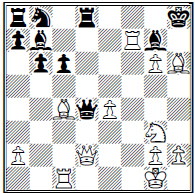
It seems as though White must trade queens, but he has a diabolical trick up his sleeve. 20.Kh1!! The beauty of dropping a queen with such an innocent and elegant move is extraordinary. (Trading queens also mates: 20.Qxd4 Rxd4 21.Bxg7+ Kg8 22.Nh5 Rd1+ 23.Rf1+ Rd5 24.Rf8#) 20...Qxd2 21.Bxg7+ Kg8 22.Rcf1 Rd5 23.Nf5 Rxf5 24.Re7+ Qd5 25.Rxf5 And with all his pieces tied down, Black is, once again, mated by force: 25...Nd7 26.Rh5 Qf7 27.Rxf7 Nc5 28.Rh8# 19...Kxg7 20.Nf5+ 1–0
And so, with the final games ended, the prize checks signed, the hotel bills reviewed, there was nothing left but to move on. We left Sturbridge, some of us heading back to our hometowns, some to the tedium of our careers, and some to new, as-yet undiscovered paths which would lead us perhaps close and perhaps far away from our current lives. But the lake, the white-washed table cloths, and the ticking of chess clocks will stay engraved on our memories and hopefully, one day, each of us will fling open the aging doors of the conference center once again.
|